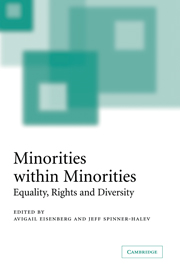Book contents
- Frontmatter
- Contents
- Notes on Contributors
- Acknowledgements
- Introduction
- Part I Toleration
- Part II Equality
- 3 Multiculturalism and feminism: no simple question, no simple answers
- 4 Can intra-group equality co-exist with cultural diversity? Re-examining multicultural frameworks of accommodation
- 5 Dilemmas of gender and culture: the judge, the democrat and the political activist
- 6 The rights of internal linguistic minorities
- Part III Individual autonomy
- Part IV Self-determination
- Part V Democracy
- References
- Index
5 - Dilemmas of gender and culture: the judge, the democrat and the political activist
Published online by Cambridge University Press: 22 September 2009
- Frontmatter
- Contents
- Notes on Contributors
- Acknowledgements
- Introduction
- Part I Toleration
- Part II Equality
- 3 Multiculturalism and feminism: no simple question, no simple answers
- 4 Can intra-group equality co-exist with cultural diversity? Re-examining multicultural frameworks of accommodation
- 5 Dilemmas of gender and culture: the judge, the democrat and the political activist
- 6 The rights of internal linguistic minorities
- Part III Individual autonomy
- Part IV Self-determination
- Part V Democracy
- References
- Index
Summary
The phrase “minorities within minorities” alerts us to both parallels and potential collision. It suggests a symmetry between groups that have been minoritized by virtue of their race, ethnicity, religion, language or culture, and sub-groups within these, minoritized by virtue of age, sexuality, gender or class. If the disadvantages suffered by the larger minority give rise to legitimate claims, consistency requires us to address further disadvantages that may affect minorities within it: we cannot, in all fairness, say that public authorities should tackle the injustices that attach to one group but feel under no obligation to deal with those that attach to the others. The further implication is that these two concerns may collide. In particular, actions designed to strengthen the position of a cultural or religious minority within the larger society may simultaneously strengthen the power of cultural and religious leaders over dissidents within their group. Women and young people will often bear the brunt of this.
This tension has been the burden of much recent discussion of the relationship between feminism and multiculturalism (e.g. Okin 1998, 1999a, 2002; Deveaux 2000a; Shachar 2001; Spinner-Halev 2001). Multiculturalism takes issue with the monoculturalism that informs much contemporary thought and practice, stresses the diversity of the many cultures that make up contemporary societies, and argues that societies and/or governments should recognize the legitimacy of at least some cultural claims.
- Type
- Chapter
- Information
- Minorities within MinoritiesEquality, Rights and Diversity, pp. 113 - 134Publisher: Cambridge University PressPrint publication year: 2005
- 18
- Cited by

